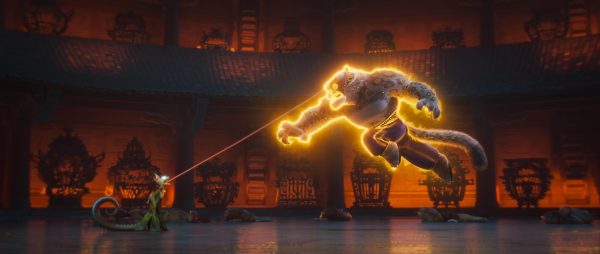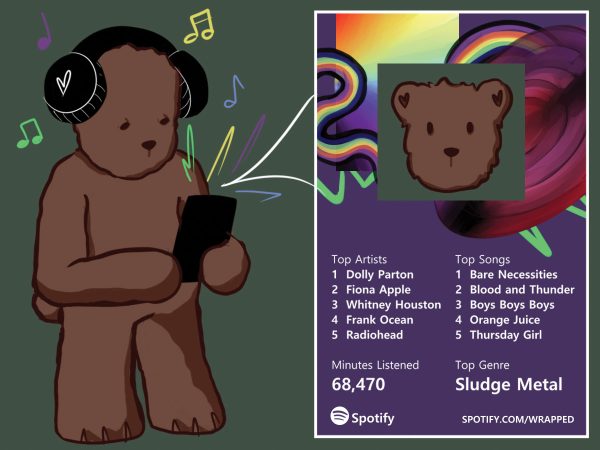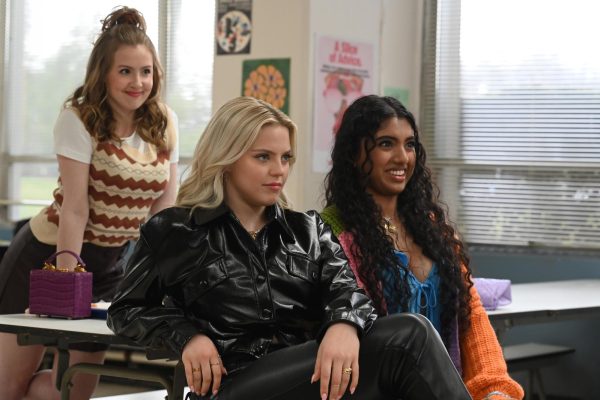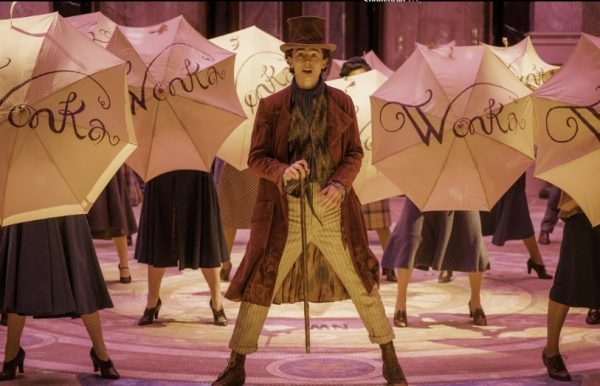‘Licorice Pizza’: Fun, melancholic masterpiece
January 12, 2022
Part of the appeal of “Licorice Pizza” is figuring out what it is really about along the way. It is not entirely clear from the start, except maybe one thing: it is probably not a good idea for Alana (Alana Haim) and Gary (Cooper Hoffman) to get together.
Their very first conversation says it all. Gary’s insistent flirting flatters Alana, who works as an assistant for the photography company his school hired to take yearbook pictures. She states the obvious, unavoidable facts—she is 25 and he is 15. Romantic or not, however, there is chemistry between them. In just the opening scene, both manage to make the other laugh, rage, but most of all, feel alive. Thus, a friendship begins, one that is so electric and brims with fascination and desire as both Gary and Alana try to understand what is drawing them toward each other.
Gary is an aspiring actor and hustler, viewing everything and everyone he happens upon in the San Fernando Valley as an opportunity to make money, though it is not as if he needs it; his mother seems affluent enough to book him small acting gigs. At first, it seems Gary only uses Alana for his own benefit, whether as his chaperone on a New York trip or eye candy to promote his waterbed business, but when opportunities arise, he can not seem to let her go. Alana does not even attempt to define herself. She does not have a secure job and has not gone to college, so helping Gary and his 15-year-old friends build small, unstable franchises and scam Jon Peters (played by Bradley Cooper in one of the most off-the-wall movie moments of the last decade) is the perfect escape route from her responsibilities. Through the hilarity and tenderness, as Alana’s and Gary’s essences are slowly rolled out, it becomes painfully clear Gary just wants to be an adult already and Alana just wants to be a teenager again. Their relationship, undefined but strong, only furthers their ignorant blindness to the rest of the world, keeping them trapped in their own bubble.
That bubble never pops for Gary. Alana finds a way out of it and is able to see Gary for what he is, but will never admit to himself—lost. She is forced to reckon with the rest of the world when it becomes too overbearing to ignore, choosing to take on a job working for the liberal political office for mayoral candidate, Joel Wachs (Benny Safdie). Her heart is not in the job, though. Even if she boasts to Gary that it is, for Alana, being an adult isn’t as easy as flipping a light switch. Her eventful workplace tribulations help her understand what she had with Gary, a stupid teenager who used her as much as she used him, was the best she had at the moment—and she can not deny her innate love for the act.
And thus, the nature of “Licorice Pizza” is revealed to be about the power and joy of settling for someone.
The movie’s sad undertones about its subject’s lack of compatibility can not help but stay powerless to the feel-good atmosphere created by Hoffman and Haim.
Yes, this does deflate the idea of love entirely, but do not be fooled. This is among the most purely fun and passion-filled films of last year. For starters, it is deeply funny. As mentioned before, the movie stops for about 30 minutes to watch Gary, Alana and their crew evade the wrath of Jon Peters after ripping him off with their waterbed business. Another brilliant scene is when the desk lady at the acting agency interrogates Alana. The movie’s sad undertones about its subject’s lack of compatibility can not help but stay powerless to the feel-good atmosphere created by Hoffman and Haim. Their lives may be in shambles, but at a surface level, they project strong control, like how a hard-shell taco seems to keep its contents intact while cracking with pressure. Really though, what makes this film so indestructible is writer-director Paul Thomas Anderson’s ability to immerse viewers into his vision of 1970s California. He crafts the story of Alana and Gary inside what feels like a dream, piecing together memories belonging to him and others. Anderson brings his childhood to life, which sounds cheesy because it is. The embellished Hollywood history, depicting turned-up characterizations of the aforementioned husband of Barbara Streisand, Jon Peters and Jack Holden (who is a mirror to William Holden) places us on the grassy plains and worn-out roads of the Valley, so geographically close to the movie industry but still completely distant from its mysterious and disturbingly crazy reputation in the minds of Americans. The cinematography is carefully carefree, shot to look as if it very well could have been made in the 70s, yet the movie has all the reflection, sensibilities, and contemplation of the 2020s.
The weight and scale of this film are incredibly small. For the most part, our protagonists remain stagnant, with every long, tracking-shot running sequence forward barely taking them any further from their own personal status quo. Throughout the film, Alana dips in and out of Gary’s bubble as he takes one capital venture after another, but only their relationship to each other changes while the rest of their world and lives unaffected at large. From that first scene in the school gymnasium, happiness never seems like something feasible for the pair in the long term. But this movie, in spite of planet Earth’s better judgment, is happy.
After all, licorice doesn’t usually go with pizza, but there’s nothing’s really stopping you from putting them together.
Have you seen “Licorice Pizza” yet? Let us know in the comments below.





























































































Luke Stagg • Jan 12, 2022 at 3:44 pm
Credit where credit is due: my sister (Annie) came up with the last line of this